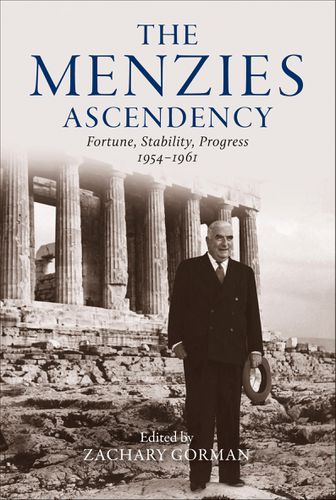Readings Newsletter
Become a Readings Member to make your shopping experience even easier.
Sign in or sign up for free!
You’re not far away from qualifying for FREE standard shipping within Australia
You’ve qualified for FREE standard shipping within Australia
The cart is loading…






Was Menzies's unprecedented electoral success merely a matter of luck, or did he make fortune bend to his will? On 30 November 1954, Robert Menzies became Australia's longest serving prime minister. Between the closely fought 1954 and 1961 elections, the Coalition enjoyed a political dominance that allowed it to reshape the nation.
The period saw the creation of the Reserve Bank of Australia, the signing of the landmark Commerce Agreement with Japan, vast investment in Australia's universities, the development of Canberra, the opening of Australia's first nuclear reactor, forgotten but transformative healthcare reforms, the abolition of the dictation test, forward progress on Indigenous policy, the signing of an enduring Antarctic Treaty, and more.
Yet to critics this was a time when the opportunity for reform was wasted. Has Menzies's deliberate emphasis on continuity over change obscured his achievements? Is consolidated progress preferable to policy revolution? And what does the Australian public want from its leaders?
All these issues are explored in the third of a four-volume history of Menzies and his world, based on conferences convened by the Robert Menzies Institute at the University of Melbourne. Contributors include Robert Bowker, Andrew Bragg, Paul Brown, Elizabeth Buchanan, Selwyn Cornish, Damien Freeman, David Furse-Roberts, Anne Henderson, Paul Kelly, Sean Jacobs, David Lee, Ted Ling, Lyndon Megarrity, Greg Melleuish, Andrew Norton, Michael de Percy, Paul Strangio and Stephen Wilks.
$9.00 standard shipping within Australia
FREE standard shipping within Australia for orders over $100.00
Express & International shipping calculated at checkout
Was Menzies's unprecedented electoral success merely a matter of luck, or did he make fortune bend to his will? On 30 November 1954, Robert Menzies became Australia's longest serving prime minister. Between the closely fought 1954 and 1961 elections, the Coalition enjoyed a political dominance that allowed it to reshape the nation.
The period saw the creation of the Reserve Bank of Australia, the signing of the landmark Commerce Agreement with Japan, vast investment in Australia's universities, the development of Canberra, the opening of Australia's first nuclear reactor, forgotten but transformative healthcare reforms, the abolition of the dictation test, forward progress on Indigenous policy, the signing of an enduring Antarctic Treaty, and more.
Yet to critics this was a time when the opportunity for reform was wasted. Has Menzies's deliberate emphasis on continuity over change obscured his achievements? Is consolidated progress preferable to policy revolution? And what does the Australian public want from its leaders?
All these issues are explored in the third of a four-volume history of Menzies and his world, based on conferences convened by the Robert Menzies Institute at the University of Melbourne. Contributors include Robert Bowker, Andrew Bragg, Paul Brown, Elizabeth Buchanan, Selwyn Cornish, Damien Freeman, David Furse-Roberts, Anne Henderson, Paul Kelly, Sean Jacobs, David Lee, Ted Ling, Lyndon Megarrity, Greg Melleuish, Andrew Norton, Michael de Percy, Paul Strangio and Stephen Wilks.
Discover new Australian nonfiction books at Readings, with biography, memoir, essays and analysis.